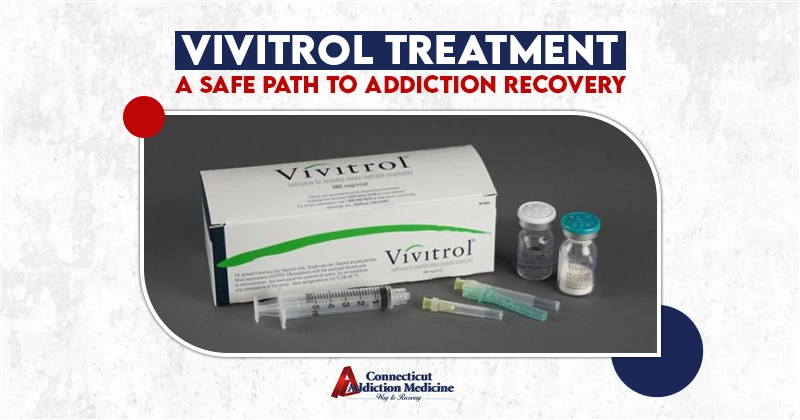Have you ever wondered if there’s medication that can help you stay sober and regain control of your life?
Vivitrol treatment may be the safe, effective path you’ve been searching for. Addiction recovery can be an overwhelming journey, filled with ups and downs.
Its mechanism of action is to prevent the pleasurable effects that the substances provide, thereby allowing patients to stay in the moment and be committed to their recovery goal.
At CT Addiction Medicine we help patients get commenced with their recovery. From medical evaluation, treatment, and ongoing support, we help you focus on your healing process and rebuilding your life.
Understanding Vivitrol: What It Is and How It Works
Vivitrol is a brand name for naltrexone, which serves as an opioid receptor blocker in the brain.
This means the user does not experience the “high” associated with using opioids or the pleasurable effects regarding the use of alcohol.
In turn, cravings decrease, and the person can concentrate on therapy, counseling, or making changes to their lives.
Benefits of Vivitrol Treatment
Mitigates Cravings and Risk of Relapse
Vivitrol mitigates the desire to drink or abuse opioids, therefore greatly reducing the risk of a relapse. Clinical studies suggest that patients receiving Vivitrol injection are more likely to stay sober compared to individuals receiving counseling alone.
Convenient and Long-Lasting
Instead of taking a daily medication, just one injection a month is necessary. This increases adherence by preventing the missed dose typical of relapse.
Enhances Counseling and Therapy
Vivitrol enhances the success rate of counseling, therapy, and lifestyle modifications in recovery.
Proven Effective Studies
Vivitrol for alcoholism or opiate is safe and effective. For this reason, it is considered a first-line treatment option for medication-assisted treatment (MAT).
Who Can Benefit from Vivitrol Treatment?
Vivitrol is suitable for adults recovering from:
- Opioid dependence
- Alcohol use disorder
- Individuals who want a non-addictive recovery medication
- People who have struggled with medication compliance
Vivitrol vs Suboxone:
| Feature | Vivitrol | Suboxone |
| Type | Opioid antagonist | Partial opioid agonist |
| Addictive Potential | Non-addictive | Low risk of dependency |
| Administration | Monthly injection | Daily sublingual film/tablet |
| Craving Control | Blocks receptors | Reduces cravings |
| Detox Required | Yes | No |
Both drugs can work, but Vivitrol vs Suboxone really depends on personal choice, and your recovery stage. If someone has completed detoxification, and is looking for an opioid-free option, Vivitrol is the best option.
Possible Side Effects of Vivitrol
Like all medications, Vivitrol may have some side effects. Most are mild and temporary.
Common Side Effects
- Nausea or vomiting
- Headache
- Fatigue
- Muscle pain
- Injection site reactions (swelling, redness, or tenderness)
Serious Side Effects (Rare)
- Allergic reaction or rash
- Liver problems (symptoms: dark urine, jaundice)
- Depression or mood changes
Steps Involved in Vivitrol Treatment
Medical Evaluation
Your process begins with a thorough medical evaluation to assess whether Vivitrol would be a good fit.
Detoxification
Patients must be opioid-free when beginning the Vivitrol injection program. The primary goal of this step is to ensure your safety by preventing withdrawal.
First Injection
When cleared to start the program you will receive your first Vivitrol shot, which is generally administered in the gluteal muscle.
Continued Care
You will be scheduled for follow-up appointments to ensure continued progress. Counseling and therapy sessions are offered with the medication for a comprehensive support of the recovery process.
What to Expect After Starting Vivitrol
Patients start to notice increased focus, emotional regulation, and decreased triggers over time. As Vivitrol and other naltrexone products work by blocking the opioid receptor when a person relapse, they will not get a euphoric high that may help them quickly return to recovery.
Vivitrol Treatment Facts
- Vivitrol does not lead to dependence. It works by blocking receptors for pleasure rather than stimulating them.
- Medication is an adjunct to recovery, it can ‘be helpful,’ but it will never replace an individual’s commitment or clinical support.
- The Vivitrol injection also takes time and continuity. Benefits will grow with counseling and ongoing care.
Lifestyle Changes to Support Vivitrol Treatment
Combining Vivitrol and healthy behaviors supports recovery:
- Engage in support groups (AA, NA)
- Keep a routine each day
- Steer clear of triggers and high-risk environments where possible
- Healthy balanced meals
- Exercise regularly
Conclusion
Although it is difficult to recover from addiction, Vivitrol offers a safe and tested way to maintain the process. With Vivitrol, cravings will be blocked, relapses prevented, and those losing control of their lives will regain control.
Vivitrol for alcoholism or opioids is useful in recovery, but it is also useful in recovery from both substances and can help keep you grounded in recovery.
If someone is ready to begin their next step towards recovery from addiction, feel free to contact CT Addiction Medicine today.
FAQs
Q:What is Vivitrol used for?
Vivitrol helps detoxify someone from alcohol and opioid dependence, reducing cravings and blocking the feeling of euphoria.
Q:How often is Vivitrol given?
It is administered as a Vivitrol injection once every 4 weeks.
Q:Can Vivitrol lead to addiction?
No, Vivitrol is completely non-addictive.

